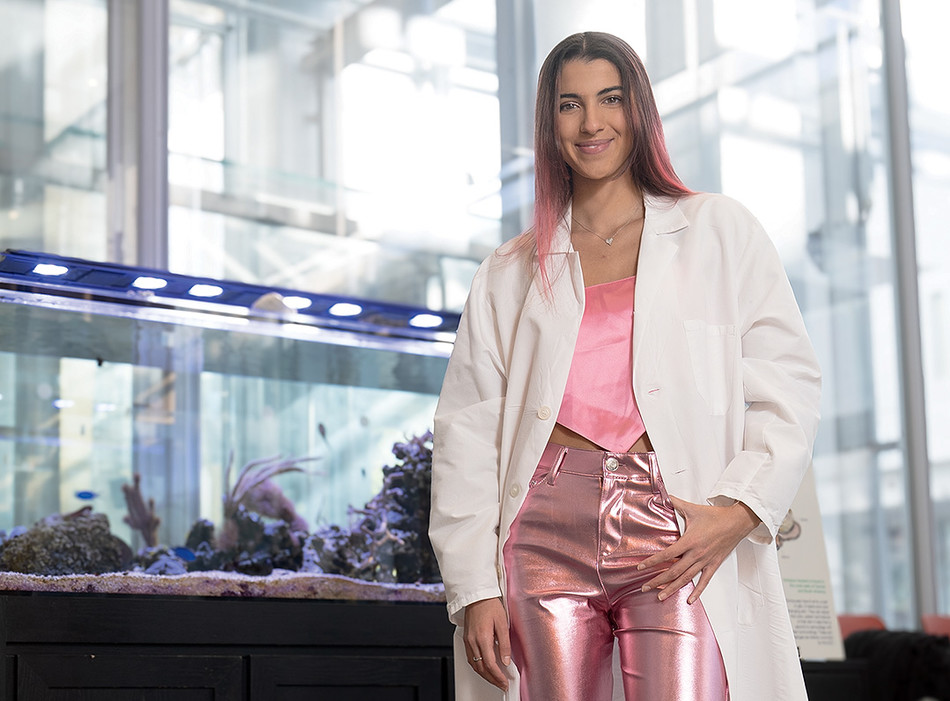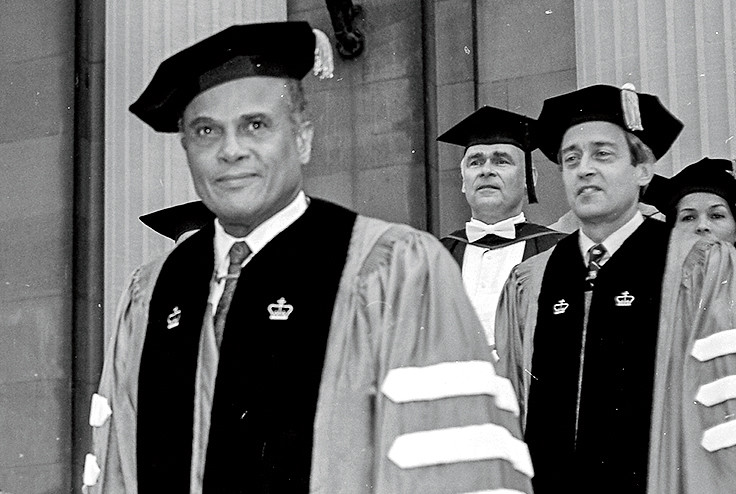In a sun-filled laboratory at the Zuckerman Institute in Manhattanville, amid shelves of beakers and bottles, Sarafina Belafonte, a Columbia College sophomore, takes a break from her work on Sepia bandensis, also known as the dwarf cuttlefish, to talk about her grandfather, Harry Belafonte ’93HON, who died last year at ninety-six.
Harry Belafonte was born in Harlem and raised there and in Jamaica. He became a megastar in segregation-era America, a Black singer and actor who used his enormous success to advance civil and human rights. In 1956, the year his album Calypso became the first-ever LP to sell a million copies, he befriended the young pastor Martin Luther King Jr. and backed him financially. He helped organize the March on Washington and funded the Freedom Rides. On television, he promoted Black artists and viewpoints. For the rest of his life, he spoke out for “the cause.”
“My grandfather was a trailblazer,” says Sarafina, noting his close ties to the singer, actor, and activist Paul Robeson 1923LAW. “It was from Paul that I learned that the purpose of art is not just to show life as it is but to show life as it should be,” Belafonte once said. Says Sarafina, “My grandpa idolized Robeson.”
Sarafina was born in 2003. She attended preschool at the Hollingworth Center at Teachers College, named after the educator Leta Stetter Hollingworth 1913TC. Hollingworth’s program for exceptional children at the Speyer School (part of Teachers College) in the 1930s inspired Sarafina’s mother, the Danish-born model and singer Malena Belafonte, to cofound the Speyer Legacy School, a K–8 school for gifted children, near Columbus Circle. Sarafina became its first student (“My number was 0001”).
She excelled in academics, especially math, and when she reached high school she enrolled in advanced classes in linear algebra. Then, in her junior year, her interests shifted. Her maternal grandmother, a classical recorder player and music professor, developed a brain tumor. “A botched surgery left my grandma with a six-centimeter hole in her forehead, where you can actually see her brain,” says Sarafina. Her grandmother began experiencing hallucinations, and Sarafina “became frustrated that I couldn’t understand what was happening in this physical thing I could see.” Wanting to learn about the brain, she took a neuroscience elective and was hooked.
Of course, given her background, she was also immersed in the arts. She had studied dance since age three, and whenever she performed, Grandpa was in the audience, smiling. “He loved to watch us perform and to hear what we were doing. He was always like” — she channels Harry’s hushed rasp — “What you up to now?” Sarafina also sang for her grandfather, to his great delight. “We had such a pure, loving relationship. He was able to be there for me and my brother in a way that he couldn’t for his children, when he was being a superstar and social activist. I think he recognized that and was trying to be better for us.”
With her varied interests and perfect SAT score, Sarafina got in to Columbia, where she joined the lab of Nobel-winning neuroscientist Richard Axel ’67CC. She loves the lab and is fascinated by the cuttlefish, a cephalopod related to the octopus and squid. “They camouflage within milliseconds of seeing the environment,” she explains. “They perceive the world around them and then use their motor neurons to reflect that perception on their skin.”
It’s no stretch to say that her grandfather, too, boldly reflected his perceptions — though in his case, it wasn’t to hide. Quite the opposite, says Sarafina. “He said what he wanted to say. And so his legacy is complicated: for a Black man with that caliber of success, there was no guidebook. He was writing that book, and so not everything was perfect. My grandpa wasn’t the best at knowing how to protect his legacy.”
In 2019, Sarafina’s parents — her father, David Belafonte, is an award-winning TV and music producer — launched, with Grandpa’s blessing, the Belafonte Family Foundation to safeguard that legacy. Its mission includes programs that address food insecurity, award scholarships, and provide free legal advice to people in underserved communities. Sarafina cherishes her memories of her grandfather — going with him to the movies, sitting with him on the beach in Jamaica — but she is also keenly aware of his impact on the wider world: the lessons he taught and the example he led.
“My grandpa opened up so many doors for Black artists, but he never separated his career from his activism,” Sarafina says. “He always asked: ‘How can I make sure that we are improving the state of this country and the world?’
“It’s all about the cause,” she adds. “Everybody has to be involved. Everybody has to see the problems, and everybody has to do something about them.”
This article appears in the Winter 2023-24 print edition of Columbia Magazine with the title "The Belafonte Legacy."




